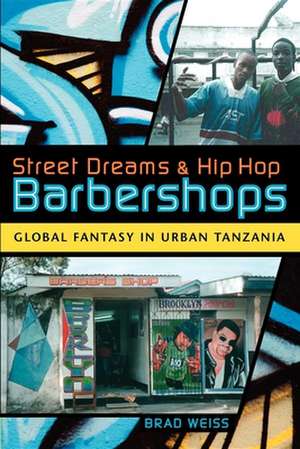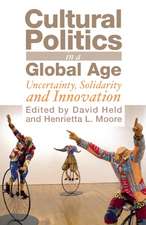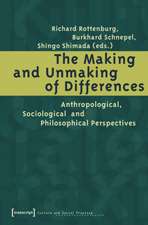Street Dreams and Hip Hop Barbershops – Global Fantasy in Urban Tanzania
Autor Brad Weissen Limba Engleză Paperback – 3 mai 2009
Preț: 200.48 lei
Nou
Puncte Express: 301
Preț estimativ în valută:
38.36€ • 41.80$ • 32.33£
38.36€ • 41.80$ • 32.33£
Carte tipărită la comandă
Livrare economică 23 aprilie-07 mai
Preluare comenzi: 021 569.72.76
Specificații
ISBN-13: 9780253220752
ISBN-10: 0253220750
Pagini: 280
Dimensiuni: 155 x 233 x 18 mm
Greutate: 0.39 kg
Editura: MH – Indiana University Press
ISBN-10: 0253220750
Pagini: 280
Dimensiuni: 155 x 233 x 18 mm
Greutate: 0.39 kg
Editura: MH – Indiana University Press
Cuprins
AcknowledgmentsIntroduction: Popular Practices and Neoliberal Dilemmas in Arusha; 1. Themes and Theories: Popular Culture in Africa and Elsewhere; 2. Enacting the Invincible: Youthful Performance in Town; Portraits 1: Bad Boyz Barbers; 3. Thug Realism: Inhabiting Spaces of Masculine Fantasy; Portraits 2: Aspiration; 4. The Barber in Pain: Consciousness, Affliction, and Alterity; Portraits 3: Uncertain Prospects; 5. Gender (In)Visible: Contests of Style; 6. Learning from Your Surroundings: Watching Television and Social Participation; 7. Chronic Mobb Asks a Blessing: Apocalyptic Hip Hop and the Global Crisis; ConclusionNotes; References; Index
Recenzii
"Dr. Weiss has chosen a very difficult group to study - young men - but also a group about which we urgently need to know much more, since they are increasingly seen, in Africa and elsewhere, as a problem-group that is potentially dangerous. . . . A seminal analysis of the global-local conundrum." Peter Geschiere, University of Amsterdam
Notă biografică
Brad Weiss is Professor of Anthropology at the College of William and Mary. He is author of The Making and Unmaking of the Haya Lived World: Consumption and Commoditization in Everyday Practice and Sacred Trees, Bitter Harvests: Globalizing Coffee in Colonial Northwest Tanganyika and editor of Producing African Futures: Ritual and Reproduction in a Neoliberal Age.
Descriere
Urban youth and popular cultural practices in East Africa















